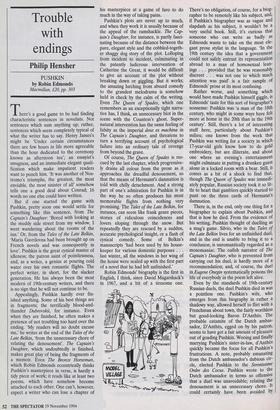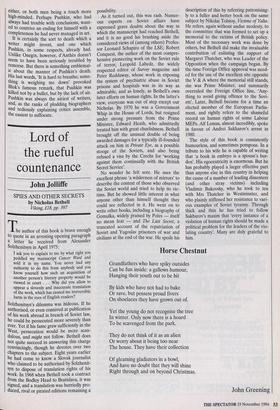Trouble with endings
Philip Hensher
PUSHKIN here's a good game to be had finding characteristic sentences in novelists. Not sentences which sum anything up; rather, sentences which seem completely typical of what the writer has to say. Henry James's might be 'Under certain circumstances there are few hours in life more agreeable than the hour dedicated to the ceremony known as afternoon tea'; an essayist's smugness, and an immediate elegant quali- fication which make impatient readers want to punch him. 'It was another of Nos- tromo's triumphs, the greatest, the most enviable, the most sinister of all' somehow tells one a good deal about Conrad; 16 words no one else could have written.
But if one started the game with Pushkin, pretty soon one would settle for something like this sentence, from The Captain's Daughter: 'Bored with looking at the muddy side street from my window, I went wandering about the rooms of the inn.' Or, from the Tales of the Late Belkin, `Maria Gavrilovna had been brought up on French novels and was consequently in love'. Pushkin is the great cynical master of idleness; the patron saint of pointlessness, and, as a writer, a genius at pouring cold water over his own romantic flights. The perfect writer, in short, for the slacker generation. He has always been the most modem of 19th-century writers, and there is no sign that he will not continue to be.
Appealingly, Pushkin hardly ever fin- ished anything. Some of his best things are in fragments; the terrifically blood-and- thunder Dubrovskii, for instance. Even when they are finished, he often makes a pretence of not troubling too hard over the ending. 'My readers will no doubt excuse me,' he writes at the end of the Tales of the Late Belkin, 'from the unnecessary chore of relating the denouement'. The Captain's Daughter, which undoubtedly is finished, makes great play of being the fragments of a memoir. Even The Bronze Horseman, which Robin Edmonds eccentrically thinks Pushkin's masterpiece in verse, is hardly a tidy piece of work; it reads like at least two poems, which have somehow become attached to each other. One can't, however, expect a writer who can lose a chapter of his masterpiece at a game of faro to do much in the way of taking pains.
Pushkin's plots are never up to much, and when they work it is usually because of the appeal of the ramshackle. The Cap- tain's Daughter, for instance, is partly fasci- nating because of the distance between the pure, elegant style and the cobbled-togeth- er shaggy dog story of the plot. Lolloping from incident to incident, culminating in the patently ludicrous intervention of Catherine the Great, it would be difficult to give an account of the plot without breaking down or giggling. But it works; the amazing lurching from absurd comedy to the grandest melodrama is somehow held in check by the calm of the writing. Even The Queen of Spades, which one remembers as an exceptionally tight narra- tive has, I think, an unnecessary blot in the scene with the Countess's ghost. Super- natural intervention has the same feeling of falsity as the imperial deus ex machina in The Captain's Daughter, and threatens to turn a terrifying account of psychological failure into an ordinary tale of revenge from beyond the grave.
Of course, The Queen of Spades is res- cued by the last chapter, which progressive- ly drains all colour from the prose as it approaches the dreadful denouement, so that the means of Herman's damnation is told with chilly detachment. And a strong part of one's admiration for Pushkin is in the way he so often produces his most memorable flights from nothing very promising. The Tales of the Late Belkin, for instance, can seem like frank genre pieces, stories of ridiculous coincidences and lovers eloping through the snow. But repeatedly they are rescued by a sudden, accurate psychological insight, or a flash of cynical comedy. Some of Belkin's manuscripts 'had been used by his house- keeper for various domestic purposes . . last winter, all the windows in her wing of the house were sealed up with the first part of a novel that he had left unfinished.'
Robin Edmonds' biography is the first in English, I think, since David Magarshack's in 1967, and a bit of a tiresome one. There's no obligation, of course, for a biog- rapher to be remotely like his subject, and, if Pushkin's biographer was as vague and slapdash as his subject, it wouldn't be a very useful book. Still, it's curious that someone who can write as badly as Edmonds wants to take on the most ele- gant prose stylist in the language. 'In the 19th century the idea that a government could not safely entrust its representation abroad to a man of homosexual lean- ings . . . provided that he was reasonably discreet . . . was not one to which much attention was paid' is a fair sample of Edmonds' prose at its most confusing. Rather worse, and something which would have made Pushkin himself giggle, is Edmonds' taste for this sort of biographer's nonsense: Pushkin was 'a man of the 18th century, who might in some ways have felt more at home in the 20th than in the 19th century'. Still, there's a lot of interesting stuff here, particularly about Pushkin's milieu; one knows from the work that Pushkin was writing for a society in which 17-year-old girls know how to do gold embroidery, but are illiterate, and about one where an evening's entertainment might culminate in putting a drunken guest alone in a locked room with a bear. Still, it comes as a bit of a shock to find that, though The Queen of Spades was immedi- ately popular, Russian society took it so lit- tle to heart that gamblers quickly started to punt on the three cards of Hermann's damnation.
There is, in the end, only one thing for a biographer to explain about Pushkin, and that is how he died. From the evidence of his writing, Pushkin thought of duelling as a mug's game. Silvio, who in the Tales of the Late Belkin lives for an unfinished duel, and in the end is unable to bring it to a conclusion, is unromantically regarded as a monomaniac. The oafish narrator of The Captain's Daughter, who is prevented from carrying out his duel, is hardly more of a recommendation; and, of course, the duel in Eugene Onegin systematically poisons the life of everybody in the poem left alive.
Even by the standards of 19th-century Russian duels, the duel Pushkin died in was a pointless one. Pushkin's wife, who emerges from this biography in rather a shadowy way, allowed herself to flirt with a Frenchman about town, the fairly worthless but good-looking Baron D'Anthes. The probable catamite of the Dutch ambas- sador, D'Anthes, egged on by his patron, seems to have got a fair amount of pleasure out of goading Pushkin. Wooing and finally marrying Pushkin's sister-in-law, d'Anthes quickly became the focus for all Pushkin's frustrations. A note, probably emanating from the Dutch ambassador's dubious cir- cle, elected Pushkin to the Serenissime Ordre des Cocus. Pushkin wrote to the Dutch ambassador in terms so offensive that a duel was unavoidable; relating the denouement is an unnecessary chore. It could certainly have been avoided by either, or both men being a touch more lugh-minded. Perhaps Pushkin, who had always had trouble with conclusions, want- ed to contrive an ending for himself with a completeness he had never managed in art. It is certainly the sort to death which a writer might invent, and one which Pushkin, in some respects, already had. Unlike Onegin, however, d'Anth6s doesn't seem to have been seriously troubled by remorse. But there is something emblemat- ic about the manner of Pushkin's death. His last words, 'It is hard to breathe; some- thing is weighing me down' provoked Blok's famous remark, that Pushkin was killed not by a bullet, but by the lack of air. Pushkin was always the airiest of writers, and, as the ranks of plodding biographers and tediously explaining critics assemble, the easiest to suffocate.



















































































 Previous page
Previous page